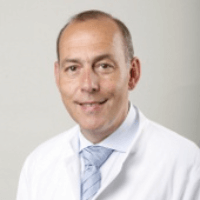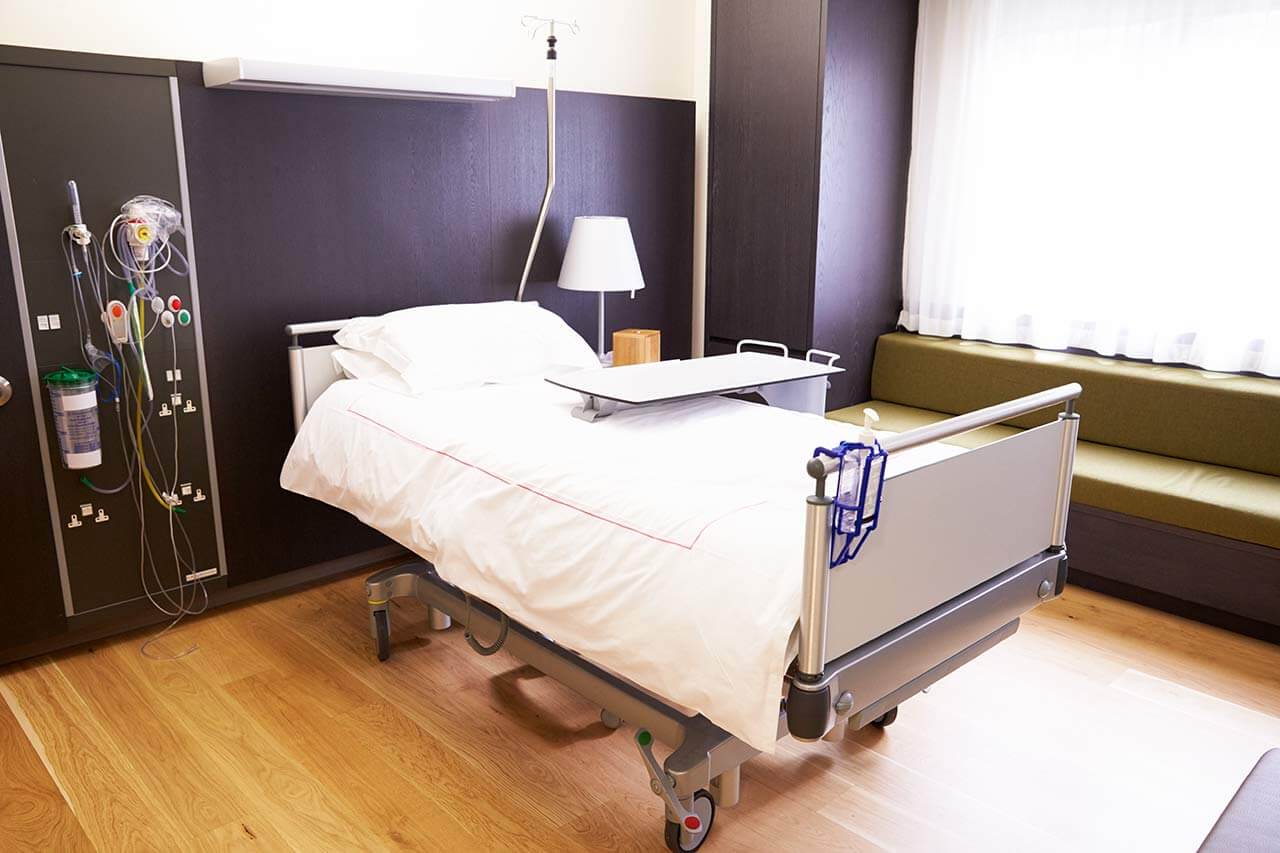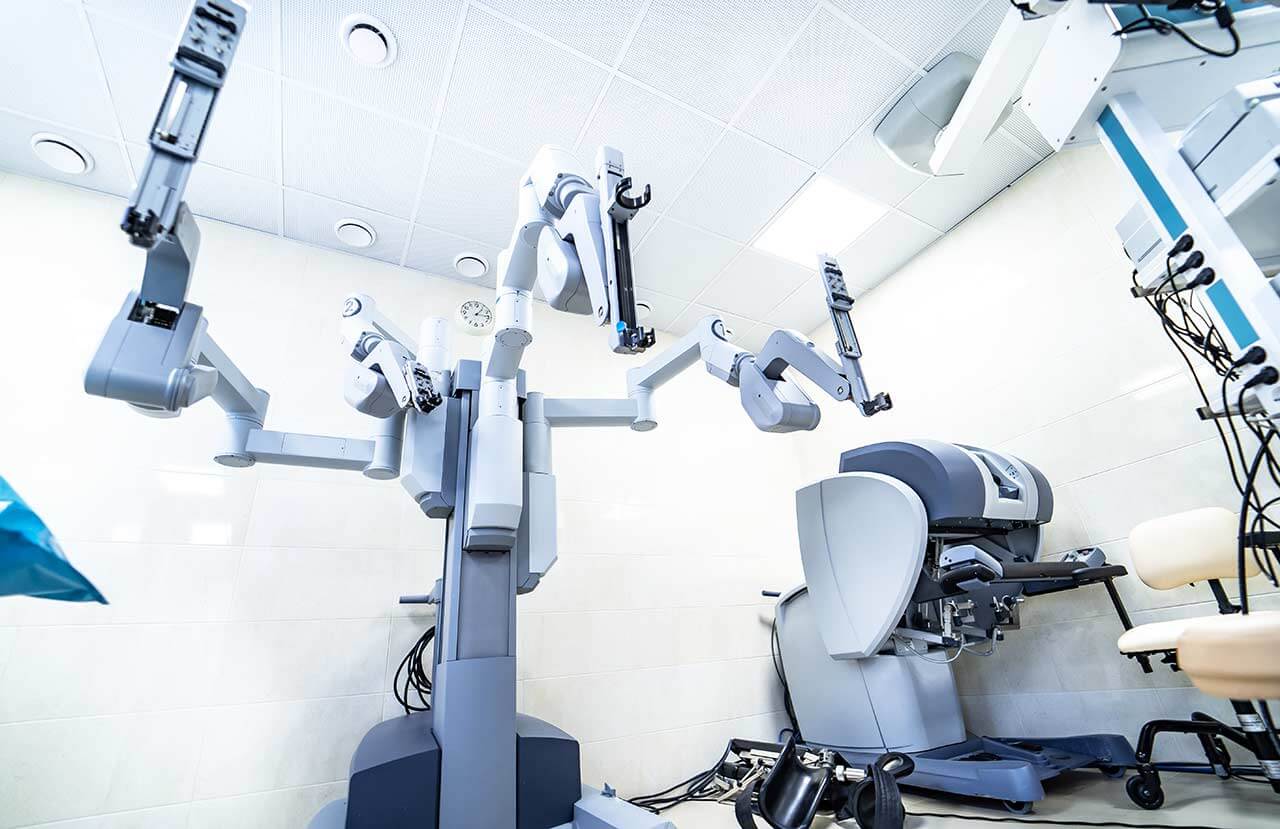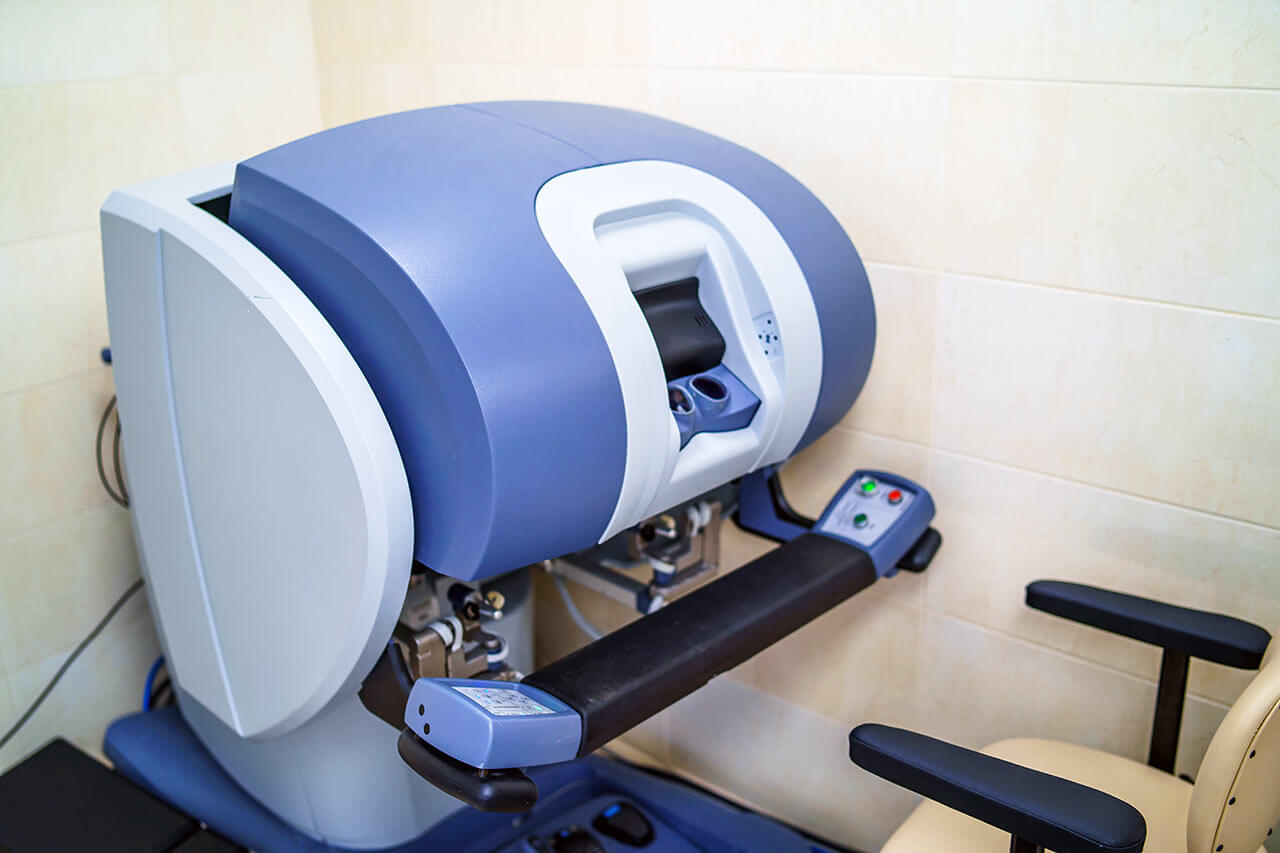
The program includes:
- Initial presentation in the clinic
- clinical history taking
- review of medical records
- physical examination
- laboratory tests:
- complete blood count
- general urine analysis
- biochemical blood test
- inflammation markers (CRP, ESR)
- blood coagulation analysis (aPTT, PT, INR)
- PCR testing
- gynecological examination:
- colposcopy
- vaginal swab
- biopsy with histological study (if clinically indicated, additional cost is 2000 €)
- transvaginal ultrasound
- ultrasound of abdomen and pelvic organs
- nursing services
- consultation of related specialists
- treatment by chief physician and all leading experts
- explanation of individual treatment plan
(the cost of medicines is not included)
Required documents
- Medical records
- Biopsy results (if available)
Service
You may also book:
 BookingHealth Price from:
BookingHealth Price from:
About the department
The Department of Gynecology, Gynecologic Oncology, Mammology and Obstetrics at the Knappschaft Hospital Dortmund offers the full range of medical services in the areas of its specialization. Of particular interest to the department's gynecologists is the treatment of malignancies of the female reproductive organs and breast cancer. Since the successful cancer treatment requires an interdisciplinary and comprehensive approach, the experts in the field of oncology, radiology, radiation therapy, chemotherapy, palliative care and other doctors are actively involved in the therapeutic process. The department has modern diagnostic rooms, as well as high-tech operating rooms for sparing minimally invasive interventions. Since 2011, the department has been performing robotic interventions using the innovative da Vinci Surgical System, including for the treatment of gynecologic cancers. The field of the department's competence also includes integrated management of pregnancy, delivery and the provision of postnatal care for both mother and newborn. The department is headed by Dr. med. Frank Schmolling.
In the field of gynecologic oncology, the department's patients are provided with services for the prevention, diagnostics and treatment of ovarian cancer, uterine cancer, cervical cancer and vulvar cancer (malignant tumors of the external genital organs in women). The initial stage of treatment is a comprehensive diagnostic examination. Depending on a particular clinical case, the patient may require ultrasound scanning, radiography, CT and MRI scanning, cytological and histological examinations, biopsy and other methods. With appropriate clinical indications, the department's specialists also resort to hysteroscopy and other invasive diagnostic methods in order to detect possible metastases in other organs and anatomical structures. With the diagnostic results, the specialists from related fields cooperatively develop an individual treatment regimen, taking into account the particular type of tumor, its stage, localization, the presence or absence of metastases, the general health, the presence of concomitant diseases, the patient's age, etc.
The treatment of gynecologic cancers is based on surgical resection of a malignant tumor, which can be supplemented by such conservative treatments as chemotherapy, radiation therapy, etc. At the advanced stages of oncology, it may be necessary to perform total removal of the organ, for example, ovaries, uterus. Since the department has state-of-the-art technical devices, in most cases, the surgical treatment involves the use of sparing minimally invasive techniques. The department's medical team has rich and successful experience in robotic interventions using the da Vinci Surgical System for the treatment of uterine and cervical cancer. Nowadays, robot-assisted surgery is a breakthrough in surgery, since such operations are characterized by impeccable accuracy of surgical manipulations. Only a few small skin incisions are required to provide surgical access, through which the robotic "slave manipulators" insert special instruments and a miniature camera for the transmission of images of the surgical field to a large screen. Thanks to the multiple zooming during the intervention, the surgeon can clearly see the smallest anatomical structures, vessels, which eliminates the risk of damage to the healthy tissue. In fact, the operation is performed by a robot, but it only runs the commands of a competent surgeon, who carefully controls the entire process and gives commands to the robot sitting at a special control panel. After robot-assisted surgery the patient does not need a long period of hospitalization – she can leave the hospital in a few days. In addition, miniature skin incisions virtually eliminate the risk of profuse bleeding and infections.
The department's priority clinical focus is also on breast cancer treatment. The department provides high quality screening, diagnostics and treatment of breast cancer. To detect breast cancer, the department's doctors carry out such high-precision examinations as ultrasound scanning, mammography, MRI, biopsy and others. The treatment regimen for each patient is developed individually during the interdisciplinary tumor boards. Should surgical treatment be required, minimally invasive techniques are used, if possible. If the patient requires total mastectomy, she is additionally offered breast reconstruction surgery using implants and/or autologous tissues, which is performed in cooperation with the Department of Plastic and Aesthetic Surgery. The therapeutic options are also complemented by chemotherapy and radiation therapy. As a rule, these types of treatment are carried out on an outpatient basis. In addition to classic irradiation, intraoperative radiation therapy can also be provided.
The department has all the modern resources for the integrated management of pregnancy, labor management and follow-up care for both mother and child. Depending on the course of childbirth and the patient's clinical indications, it is possible to carry out natural childbirth or perform a C-section in a specially adapted operating room. To relieve pain during childbirth, the patients are offered homeopathy, acupuncture and epidural anesthesia. The baby is delivered by experienced obstetrician-gynecologists who make every effort to ensure the fast and safe childbirth.
The department's key clinical focuses include:
- Gynecologic oncology
- Diagnostics and treatment of uterine cancer
- Diagnostics and treatment of cervical cancer
- Diagnostics and treatment of ovarian cancer
- Diagnostics and treatment of vulvar cancer
- Surgical treatment, including laparoscopic and robot-assisted operations
- Chemotherapy
- Radiation therapy
- Mammalogy
- Diagnostics and treatment of breast cancer
- Surgical treatment, including follow-up reconstructive surgery using implants or autologous tissue
- Chemotherapy
- Radiation therapy, including intraoperative radiation therapy
- Diagnostics and treatment of breast cancer
- General gynecology
- Diagnostics and treatment of uterine fibroids
- Drug therapy
- Uterine artery embolization in the case of uterine fibroids
- Enucleation of uterine fibroids
- Hysterectomy
- Diagnostics and treatment of endometriosis
- Hormone therapy
- Surgical removal of the foci of endometriosis
- Diagnostics and treatment of pelvic organ prolapse (bladder, bowel or uterus)
- Vaginoplasty
- Correction of prolapse using a special mesh
- Hysterectomy
- Vaginal sacrospinal fixation according to Amreich-Richter and sacrocolpopexy
- Diagnostics and treatment of genital warts
- Laser surgery (CO2 laser)
- Diagnostics and treatment of uterine fibroids
- Obstetrics
- Integrated management of pregnancy
- Labor management (vaginal childbirth and C-section)
- Postpartum care for both mother and newborn
- Other diagnostic and therapeutic options
The department's range of surgical services includes:
- Robot-assisted surgery using the da Vinci Surgical System
- Hysterectomy for uterine and cervical cancer
- Surgical repair of pelvic organ prolapse
- Endometriosis surgery
- Minimally invasive surgery
- Laparoscopy
- Tubal sterilization
- Chromopertubation (method for infertility diagnostics)
- Surgery to treat ectopic pregnancy
- Surgery to treat infertility
- Surgery to treat endometriosis
- Surgery to remove ovarian cysts
- Surgery to remove ovaries and fallopian tubes
- Surgery to remove uterine fibroids
- Hysterectomy
- Surgery to eliminate adhesions caused by previous interventions
- Hysteroscopy
- Surgery to remove polyps and uterine fibroids
- Hysteroscopy to diagnose infertility
- Hysteroscopy to diagnose haemorrhages
- Surgery to remove uterine septum
- Laparoscopy
- Laser surgery
- Removal of genital warts using the CO2 laser
- Outpatient surgery
- Hysteroscopy and endocervical curettage of the cervix and its cavity
- Tissue sampling for biopsy
- Minor breast surgery
- Curettage in the case of miscarriage
- Assessment of the tubal patency in the case of an unfulfilled desire to have children
- Minor surgery on external gental organs in women
- Other methods of surgical treatment of gynecologic diseases
Curriculum vitae
Higher Education, Postgraduate Training and Professional Career
- Study of Human Medicine at the Philipps-University of Marburg and the Free University of Berlin.
- 1990 Admission to medical practice.
- 1990 - 1996 Clinical training for board certification in Gynecology and Obstetrics at the Frankfurt Höchst Hospital.
- 1996 Board certification in Gynecology and Obstetrics.
- 1996 - 1997 Senior Physician, Department of Gynecology, Hospital of the Holy Spirit Frankfurt am Main.
- 1997 - 2002 Senior Physician, Department of Mammology (focus on surgery and breast cancer treatment), Offenbach Clinic.
- Since February 2002 Chief Physician of the Department of Gynecology, Gynecologic Oncology, Mammology and Obstetrics at the Knappschaft Hospital Dortmund.
Additional Qualifications
- 1998 Training Course in Stereotactic Vacuum Aspiration Breast Biopsy at the European Surgical Institute, Hamburg.
- Optional advanced training in Special Surgical Gynecology.
- Participation in the work of the European Academy of Senology in Duesseldorf.
Memberships in Professional Societies
- Since 1995 Member of the Professional Association of Gynecologists.
- Since June 1996 Member of the Working Group on Gynecologic Endoscopy of the German Society of Gynecology and Obstetrics.
- Since February 1997 Member of the German Society for Perinatal Medicine and Obstetrics.
- Since April 1998 Member of the Middle Rhine Society of Gynecology and Obstetrics.
- Since 2011 Member of the Working Group on Robot-Assisted Surgery in Gynecology.
Photo of the doctor: (c) Knappschaftskrankenhaus Dortmund
About hospital
The Knappschaft Hospital Dortmund is a progressive multidisciplinary medical complex providing high quality medical care according to international standards. The hospital was founded in 1958, therefore it has a long history and rich clinical experience. After the overhaul and extensive works on the expansion and modernization of the hospital, it is now rightfully considered one of the largest and best not only in Dortmund, but also in Germany. The medical facility is an academic hospital of the Ruhr-University Bochum, thanks to which it has access to innovative medical developments that it successfully applies in daily clinical practice. The hospital includes 14 specialized departments and 14 narrowly focused centers, many of which have received prestigious quality certificates from professional medical societies in Germany.
The hospital has 451 beds for inpatient hospitalization. It annually treats more than 21,000 inpatients and more than 46,000 outpatients, which confirms the impeccable quality of medical service and high credit of trust from the patients. More than 40,000 children have been born here since the opening of the hospital.
The hospital presents almost all fields of modern medicine, including oncology, urology, gynecology, general surgery, cardiology, neurology, gastroenterology, orthopedics, etc. In 2010, the Cancer Center of the hospital became the first medical facility in North Rhine-Westphalia, which was certified by the German Cancer Society. According to the reputable Focus magazine, the Prostate Center has been ranking among the best in its field of competence for many years in a row. In addition, since 2010, the hospital has been using the da Vinci Surgical System, which allows the doctors to perform minimally invasive interventions with maximum accuracy and guaranteed successful results. Robot-assisted surgery is most often used in the hospital for the treatment of urologic, gynecologic diseases, the treatment of colon cancer, as well as for interventions on the pancreas, spleen and adrenal glands.
In 2005, the hospital became the first medical center in Dortmund certified according to the KTQ (Cooperation for Transparency and Quality in Healthcare) standards, and since then this certification has been regularly confirmed. The KTQ certificate is a guarantee of the excellent quality of medical services, so the patients of the hospital can count on the effective treatment, responsive care, and strict adherence to all hygiene and safety standards.
Photo: (с) depositphotos
Accommodation in hospital
Patients rooms
The patients of the Knappschaft Hospital Dortmund live in comfortable rooms made in a modern design. Each patient room is equipped with an ensuite bathroom with shower and toilet. The standard patient room furnishing includes a comfortable automatically adjustable bed, a bedside table, a wardrobe, a table and chairs for receiving visitors, a TV and a telephone. All patient rooms have Wi-Fi. If desired, the patient can use a special service – rent an iPad (from 8:00 a.m till 16:00 p.m.).
The hospital also offers enhanced-comfort patient rooms, which correspond to the level of a luxury hotel. The furnishing of such patient rooms include a comfortable bed, a wardrobe, a desk and chairs, upholstered furniture, air conditioning, minibar, modern multimedia system with flat-screen TV, telephone, radio and Wi-Fi. The bathrooms of the enhanced-comfort rooms are equipped with all the necessary toiletries, towels and a hairdryer. In the lobby of the block with enhanced-comfort rooms, patients are offered fresh fruits, as well as soft and hot drinks.
Meals and Menus
The patient and the accompanying person are offered tasty and varied meals. Every day, the menu features 22 dishes prepared from the freshest products using the Sous Vide technique – cooking in a vacuum. Such cooking technique preserves all the nutrients and vitamins, ensuring a healthy and nutritious diet for patients.
The patients living in enhanced-comfort rooms are offered a separate menu for breakfast, lunch and dinner. Moreover, the patients are additionally provided with fruit juices, mineral water, coffee, tea, as well as pastries, cakes, fruits, yoghurts, cottage cheese and other snacks.
Further details
Standard rooms include:
Religion
The religious services can be provided upon request.
Accompanying person
During the inpatient program, an accompanying person may stay with the patient in the room or at a hotel. Our managers will help you choose the most suitable option.
Hotel
During the outpatient program, the patient may stay at the hotel. Our managers will help you choose the most suitable option.






